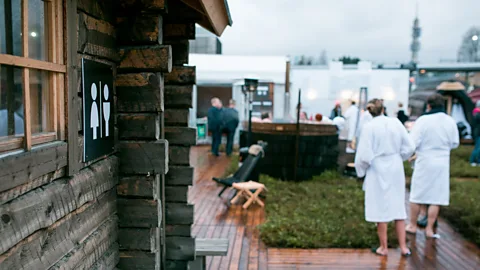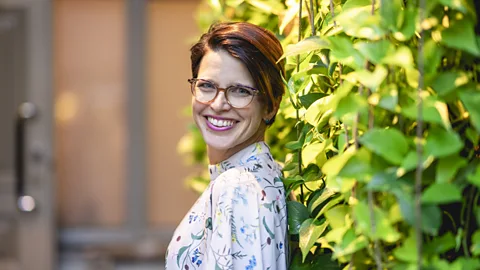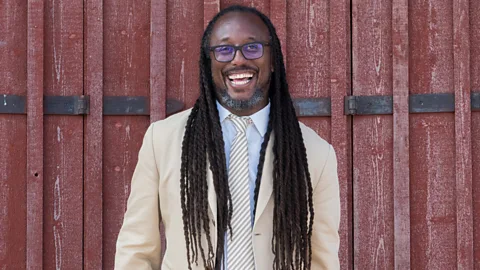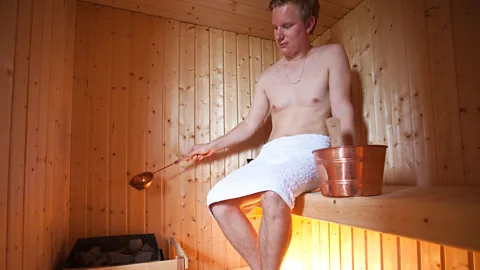Why are saunas stressing out start-ups?
 Jussi Ratilainen
Jussi RatilainenSaunas at tech and business events are causing a heated debate in the Nordics, where critics say the traditional Scandinavian habit is dampening efforts to improve diversity.
Even the most extroverted of networkers might find their hands getting clammy or their hearts beating faster while meeting potential business partners for the first time.
But imagine going through the same experience while sweating it out in a sauna, dressed only in swimwear or a towel. In Scandinavia, it’s a business practice that’s quite common.
In recent years, mixed-gender sauna parties have become regular side events at festivals, conferences and company away-days for Scandinavia’s thriving start-up and creative communities. The parties are designed to encourage both local and international attendees to talk shop in the informal setting of a wooden room or cabin fired up to 80C (176F).
“It is a good ice breaker,” argues Inna-Pirjetta Lahti, CEO of Ping Helsinki, a media and influencer agency that regularly organises sauna parties, typically at the beginning of business conferences. “In Finland, it is a sign of trust to share sauna moments... and we want to build up a base for open discussions in the rest of the conference or workshops.”
However, even in the Nordics, where the ritual of roasting in a sauna is baked into everyday life, there is an increasingly vocal backlash against incorporating the tradition into the start-up scene, at a time when it’s lack of gender diversity is already in the spotlight.
“I really like saunas, but I don’t want to go to one in that environment,” argues Henna Keränen, 32, head of partnerships and digital marketing for Sting, a major incubator for start-ups based in Stockholm. She says she has turned down multiple invitations to sauna parties in the region. “For me as a woman, it doesn’t feel right to be sat there half-naked... a sauna should be a private event, not job-related.”
 Ping
PingBros’ club
Although Scandinavia is often viewed globally as a beacon for gender equality, women still lag behind in pay, management and company ownership. In the start-up scene, only 1% of Nordic investments registered in 2018 went to companies headed solely by female founders, according to figures analysed by Swedish business news site DI Digital. While many tech events in the region have been actively working to attract more female speakers in recent years, very few achieve gender equality when it comes to ticket sales. In Stockholm, a recent attempt to break the record for the world’s biggest hackathon for women failed, despite organisers offering free tickets to one of the region’s largest annual start-up events, STHLM Tech Fest, for all female hackers and a male or female guest of their choice.
“Saunas are not helping us to make the industry more inclusive,” argues Jenny Ruth Hrafnsdottir, an engineer and partner at the Iceland-based venture capital firm Crowberry, who has been one of the most openly vocal critics of sauna parties in recent months.
She suggests that tech events should “stay away from saunas” while gender diversity remains a hot topic in the start-up scene.
Her argument is that since there are already a disproportionately small number of women working in the “male-dominated world” of the tech scene, sauna parties further promote the idea of a “bros' club” by inadvertently creating an exclusive space for men at start-up events and exacerbating the chance of venture capitalists investing in people who are similar to themselves. If someone feels uncomfortable walking into a closed space of only men where everyone’s wearing nothing but a towel or swimwear, not everyone might feel welcome – resulting in a situation where only men get included on all the networking and decision-making to be had.
 Jenny Ruth Hrafnsdottir
Jenny Ruth HrafnsdottirWhile Stockholm marketer Henna Keränen doesn’t agree with the idea of an outright stop to sauna parties at tech events, she also warns of the risk of creating “small circles or clubs” of men who enjoy sauna parties, who are more likely to stick together during the rest of a conference or bump into each other at similar sauna events in future.
“Pretty often, the people you start a dialogue with… you talk to later in the evening or in the event. So those people who miss the sauna can feel that others have already bonded by the time they meet.”
She suggests that even for those women who would feel comfortable sharing mixed-gender saunas in a business context, the scheduling of these kind of events can sometimes discourage inclusion by failing to take into consideration added “hassles” more likely to be felt by female guests.
“You have to get rid of your make-up and do it again afterwards, and fix your hair,” she says. “If I saw a sauna event scheduled at 1700, my assumption would be that it is a guy organising the event.”
Meanwhile, although reports of sexual misconduct at sauna events in the Nordics are rare, some women who have attended tech scene sauna parties say they have experienced a misogynistic culture.
Rianne Vogels, a start-up consultant based in Bergen, Norway, who went to a sauna event at a company away-day while she was working for a venture capital fund, says one partner at the firm commented on her weight, while another “dropped his towel two steps away”. It wasn’t clear if it was an accident or not, but “it didn’t feel comfortable”, she recalls.
She also remembers a male colleague bragging to her on several occasions about a sauna-based negotiation meeting where his female chief financial officer didn’t attend and instead “took notes on the floor outside”. “He thought it was funny. Funny for whom?”
Fun for everyone?
Others have warned that while taking a sauna is a normalised activity for many men and women who grew up in the Nordics, event planners should be more sensitive towards expats, immigrants and international visitors who attend start-up conferences.
“I don’t feel like being butt naked in front of a bunch of dudes or women,” says Dee Johnson, 44, an American living in Stockholm who has worked in business development for gaming and video companies in the Nordics, as well as running his own company.
“When I had my own start-up, there would be these start-up-centric conferences and the people organising the event, or the organisations I worked with – they would strongly suggest that I go. It was a peer-pressure thing,” he recalls.
 Kathryn Leroux
Kathryn Leroux‘Want to be inclusive’
Organisers of major sauna parties, including media and influencer agency Ping and the Finnish Business Angels Network (a national non-profit of private investors), which has put on high-profile sauna events to coincide with tech conferences such as the 20,000-attendee Helsinki festival Slush, insist they have not had direct complaints from sauna participants in recent years.
However, the recent bubbling public debate about sauna parties in the Nordics is clearly causing some to rethink their approach. The Finnish Business Angels Network recently announced it is holding an investor karaoke party to coincide with this year’s Slush festival, instead of its usual sauna event.
“We realise going forward, as we want to be inclusive, we need to take into careful consideration what kind of events we organise,” says managing director Amel Gaily. “In the future, we will carefully consider and assess case-by-case whether we will arrange a sauna event or not.”
 Jussi Ratilainen
Jussi RatilainenSlush will still include its regular ‘Sauna Village’ at its event in November, where up to 70 guests at a time can experience the Nordic tradition of getting sweaty in a range of different cabins, before taking a cold dip. But according to its CEO Andreas Saari, “the area is meant purely for relaxing, not for doing business”.
The long-running tech festival, which says around a third of its attendees last year were women, has also produced guidelines to help the organisers of side events “take diversity and inclusion into account better”. “These were distributed last year but this year we will make them even more visible,” says Saari.
But many event organisers say they have no intention of scrapping sauna-based mingles from formal activity programmes. “Conferences are stressful and you’re exhausted and tired, and saunas are a great place where you can actually relax…and you can always have your towel around you,” says Ping CEO Inna-Pirjetta Lahti.
However, she insists her team is sensitive to the fact that not every guest will want to get involved. “We offer the chance for attendees to join sauna evenings without actually going into the sauna. You sit outside by a fire at a chillout zone instead – with your trousers or T-shirt on.”
‘Range of optional mingles’
Kristin Heinonen, a Swedish-Finnish freelance digital strategist and trend analyst based in Malmö, who has been part of the organising team at tech events with sauna activities in the Nordics, is also against dropping sauna parties from conference agendas. But she argues that the “overall vibe” of an event is the most crucial factor to take into consideration when planning towel-based interactions.
 Alamy Pictures
Alamy Pictures“If most of the investors are male and there are more men [attending], you are already kind of in an exposed situation,” she says, suggesting that having a sauna as part of these kind of events could enhance the feeling of being uncomfortable for some female attendees.
By contrast, she argues “if you have an event that is very considerate and where you think about representation and trying to attract a diverse audience, that audience will probably feel more comfortable no matter the activity.”
She highlights The Conference in Malmö, one of the events she has worked on, which has managed to achieve gender equality when it comes to attendees and speakers. Here, she says many guests “love the opportunity” to sweat it out at Ribersborgs Kallbadhus, a 19th Century public seafront bath house where, she argues, traditional gender-segregated sauna rooms contribute to making people feel more comfortable.
Others believe that event organisers are becoming much too sensitive when it comes to planning sauna events with diversity top-of-mind, although getting them to say this on the record is tricky.
“It’s not a diversity issue, it’s a privacy issue, because everybody is invited,” says one male leadership coach based in Stockholm who wishes to remain anonymous. “Political correctness is making the world so incredibly stupid.”
Naureen Nayyar, a Stockholm-based tech and sustainability consultant in her 30s, says she has connected with both female and male investors while networking at sauna parties, and hopes that the current debates won’t lead to more events removing them from their programmes.
“I think it's about having a range of optional mingles. For example, I'm much more comfortable in a sauna where everyone is in towels and grounded than in a noisy place doing karaoke with crowds,” she argues.
“It's not fair to assume that your discomfort warrants closure of things, where others may feel actually safer... I've never experienced anything but positivity at a sauna.”
